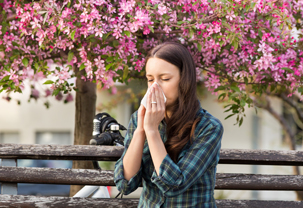
Seasonal pollening - simple rules for good eye care |
| 29.05.2020 |
 Seasonal pollening is a real nightmare of every allergic person. In our country first plants Begin to emit pollen as early as in February, and the last ones finish in November. During this whole time those who are allergic to various inhaled allergens, such as grass and tree pollen, may suffer from very troublesome ailments. Eye reactions to allergens may be especially severe due to eye’s direct exposure to the outdoor environment and lack of mechanical protection barrier. That is why it is helpful to know how to cope with burdensome symptoms of an eye allergy on everyday basis.
Seasonal pollening is a real nightmare of every allergic person. In our country first plants Begin to emit pollen as early as in February, and the last ones finish in November. During this whole time those who are allergic to various inhaled allergens, such as grass and tree pollen, may suffer from very troublesome ailments. Eye reactions to allergens may be especially severe due to eye’s direct exposure to the outdoor environment and lack of mechanical protection barrier. That is why it is helpful to know how to cope with burdensome symptoms of an eye allergy on everyday basis.
Allergy is a type of hypersensitivity to one or more environmental factors. The list of common allergens include grass, tree or shrub pollen as well as many others. During the time of seasonal pollening allergens may enter the body through conjunctiva.
The symptoms are usually bilateral, they appear suddenly but wear off equally fast. If we know which pollen we are allergic to, the pollen calendar will allow us to predict when the first allergic reactions may occur. Allergens usually cause itching, lacrimation, burning, eye redness and sandy feeling in the eyes. Subsequently conjunctival injection („red eye”) or conjunctivitis may develop. The above symptoms, frequently accompanied by allergic rhinitis, may be really difficult to cope with, so it is worth following helpful tips, which enable us to reduce the symptoms.
Learn some basic rules of good eye care during the period of high allergenic pollen concentration. Adhering to them will help every allergic person survive this most challenging season.
The above rules of everyday anti-allergy routine for people allergic to pollen should significantly reduce the burdensome ailments. If you notice the allergy symptoms for the first time or if they do not disappear in spite of following the above rules and taking recommended medications, you should consult a doctor. A pollening season does not have to result in red eyes and conjunctivitis. An appropriate prophylaxis coupled with the right treatment may protect your eyes and enable you to function normally despite your allergy.
If you complain of any of the above ailments or have any other problems with your eyes, make an appointment for a specialist ophthalmologic examination at our Centre: CONTACT